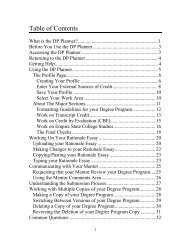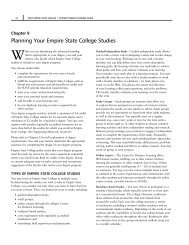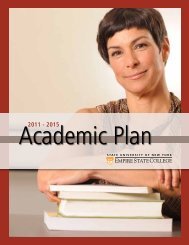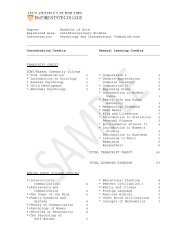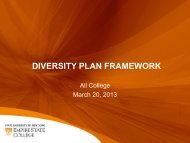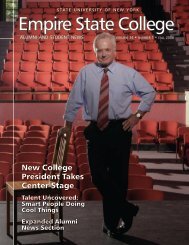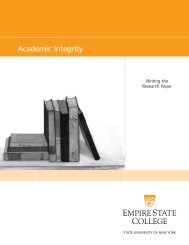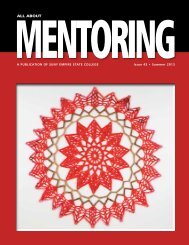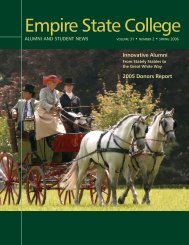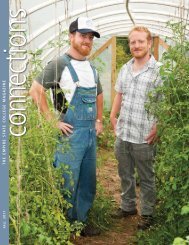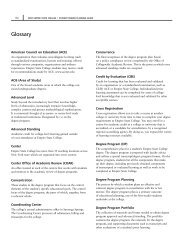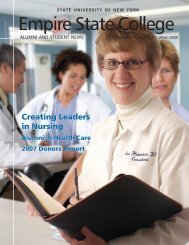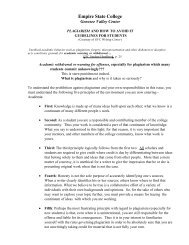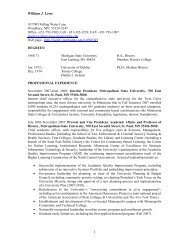All About Mentoring Spring 2011 - SUNY Empire State College
All About Mentoring Spring 2011 - SUNY Empire State College
All About Mentoring Spring 2011 - SUNY Empire State College
Create successful ePaper yourself
Turn your PDF publications into a flip-book with our unique Google optimized e-Paper software.
77<br />
democratic learning did not simply validate<br />
the experience of the immigrant domestic<br />
laborers with whom she worked. Their<br />
learning was brought together with that of<br />
other kinds of workers, with labor unions,<br />
with academic activists and community<br />
groups, in a process that had the potential to<br />
build a “coalitional consciousness” (p. 39).<br />
<strong>All</strong> this supports Gordon and Ramdeholl’s<br />
realistic observation that, absent of a<br />
broader social movement, actively<br />
struggling for change, we should not<br />
expect too much of popular education<br />
programs. In the presence of such a<br />
movement, opportunity for “praxis”<br />
certainly exists, and Gordon and Ramdeholl<br />
point to the Citizenship Schools of the<br />
civil rights movement as a case in point.<br />
The larger point is that adult education,<br />
indeed all education, does not take place<br />
in a vacuum. It exists “in a sociocultural,<br />
political, and economic context” (p. 94)<br />
observes Wendy Yanow in the volume’s<br />
conclusion. Educators and students must<br />
work within the constraints set by that<br />
context. But just as important, they must<br />
be ready to jump at the opportunities<br />
created when that context shifts, and the<br />
lines of force in the field of power begin to<br />
rearrange themselves accordingly.<br />
And when this does happen – and it might<br />
now be happening, on the heels of the right’s<br />
assault in Wisconsin on the working men<br />
and women of the public sector unions –<br />
it needs to be stressed that creating and<br />
maintaining connections to other popular<br />
institutions is critical. These institutions have<br />
political experience and resources of their<br />
own, and can help take the struggle beyond<br />
those euphoric, consciousness-raising<br />
moments in the classroom. And surely, the<br />
writing workshops and other programs<br />
described in this volume can, in turn, be an<br />
important resource for those institutions,<br />
by adding “organic” (in Antonio Gramsci’s<br />
sense) intellectuals to their activist base.<br />
Practical work needs to be done, specific<br />
issues must be identified, strategies need<br />
to be formulated and carried out, if actual<br />
leverage is to be gained. A book like this<br />
reminds us that popular education, while<br />
critical to the struggle for democracy, cannot<br />
go it alone.<br />
References<br />
Freire, P. (1973). Pedagogy of the oppressed.<br />
New York, NY: Continuum.<br />
Keating, C. (2005). Building coalitional<br />
consciousness. National Women’s<br />
Association Journal, 17(2), 86-103.<br />
Ramdeholl, D., Giordani, T., Heaney, T.,<br />
& Yanow, W. (Eds.). (2010, Winter).<br />
The struggle for democracy in adult<br />
education. New Directions for Adult<br />
and Continuing Education, No. 128.<br />
“Highly deliberate learning is a pervasive phenomenon in human life. The 700<br />
hours a year devoted to learning efforts are enormously significant for the adult<br />
himself [sic.], and for the organization, family and society in which he works<br />
and lives. Although 700 hours constitutes only 10 percent of an adult’s waking<br />
time, surely this small percentage affects his life nearly as much as the other<br />
90 percent. It is during these 700 hours a year, when he sets out to improve<br />
his knowledge, skills, perceptions, attitudes, habitual reactions, insight, and<br />
perspective, that the adult develops and changes. He resembles an organization<br />
that maintains and increases its effectiveness by devoting 10 percent of its<br />
resources to research and development.”<br />
Alan Tough, The Adult’s Learning Projects: A Fresh Approach<br />
to Theory and Practice in Adult Learning, 1971, p. 4<br />
suny empire state college • all about mentoring • issue 39 • spring <strong>2011</strong>



